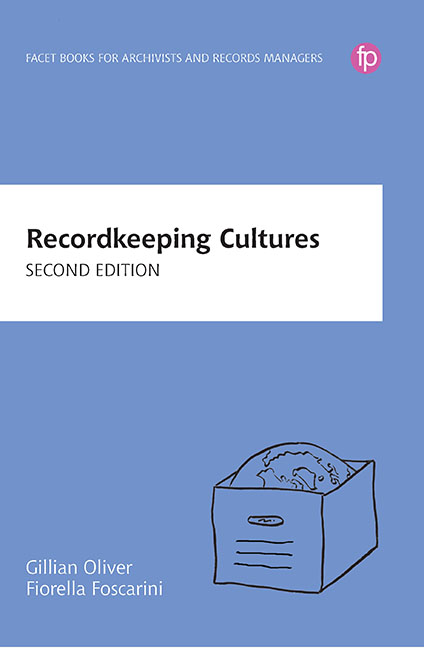10 - Bringing it all together and moving forward
Published online by Cambridge University Press: 28 October 2020
Summary
Recordkeepers are faced with enormous challenges: on the one hand, demonstrating their relevance in an information environment that is in a constant state of flux, while on the other attempting to just get on and do their job of managing information as evidence, for accountability purposes. The demands of one may mean that the other is neglected, or only partially addressed. Additionally, in their role as mediators between various subject area experts (who may have very different needs in terms of both evidence and information) and IT specialists (responsible for designing and maintaining the systems used to manage corporate information) records professionals occupy a rather uncomfortable position in organisations, one that requires not only disciplinary knowledge but also ‘people skills’. The latter may be described as the ability to listen and to communicate effectively, thereby building relationships of trust and productive interactions with coworkers (Bolton, 1986). Taking an information culture perspective will assist in cultivating such ‘soft skills’, thus providing a very different view of the workplace and its challenges, which in turn can lead to more creative and innovative approaches to the problems we face.
The purpose of this final chapter is twofold: first, to provide an overview of assessment techniques that have been detailed throughout the book and to consolidate the next steps suggestions for subsequent actions; and second, to consider how information culture perspectives can be included in archives and records education and training courses.
Assessment techniques
As discussed in Chapter 1, the development of new tools, standards and approaches is increasingly being trumpeted. However, the downside is that some seem to be represented as universal cure-alls, and figuring out where and when to apply them is left to the users of these new tools. As seen in Chapter 9, taking a ‘soft’ systems thinking approach may help. Another useful consideration is that existing and future methodologies for calculating metrics, such as the various maturity models and impact calculators, should be used judiciously as part of a suite of tools. We need to be able to assess when, where and how each of these is best used; if a particular approach is going to be most effective in terms of communicating to management, then that could be a very valid reason for using it. Our information culture assessment can be supplemented by using other metrics, but these cannot replace taking an information culture perspective
- Type
- Chapter
- Information
- Recordkeeping Cultures , pp. 171 - 186Publisher: FacetPrint publication year: 2019



